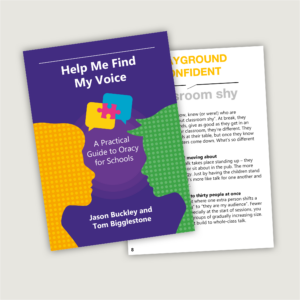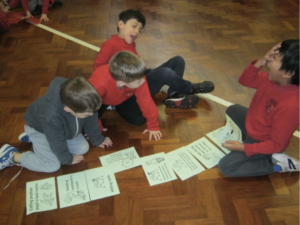About these resources
Our oracy resources fall into different categories, but they all have two things in common: they're practical and they make a difference. We write them with busy teachers in mind, so make sure they are always classroom-ready and based upon tried and tested principles they have informed our practice over the last 15 years.
Find what's most useful to you from the sections below. These are just a small selection of what you receive if you sign up to our oracy bulletin. We send an idea / lesson every week. Everything you see below is taken from there.
This will most probably mean you're a teacher, of any subject or any age or a member of SLT looking to generate whole-school change. But this toolkit is equally useful for youth group leaders or intervention specialists.

Oracy activities and games
Here are three of our favourite activities to help young people practise essential oracy and discussion skills.
Our favourite games to develop P4C skills
When running INSET, especially at this time of year, we’re often asked “what’s the best way to help pupils lacking the skills to engage in discussion?”It’s a question with many answers. But one that never fails is “use Community Builders” – fun, fast activities that zoom in on what pupils find difficult and practise them […]
How to make groupwork work better
Small-group discussions are vital for the development of children’s oracy: a smaller audience, lower stakes, and more opportunities to speak usually means greater confidence. Small groups also create more critical thinking – ideas and opinions are immediately put under scrutiny and subject to lively interrogation. But letting them off the leash to work together can […]
Philosophical Drills (…and why we should do them)
“You can bet Messi still does this everyday.” There probably isn’t a football coach in the world who hasn’t said something like this to a child who, itching to play a match, moans about about dribbling drills. My coaches said it to me and I’ve said it to hundreds of kids I’ve coached (Tom’s writing […]
Resources for juicy discussions
Our first love was Philosophy (which many claim is the "original oracy"!) so here are three of our favourite philosophical resources that are accessible for any children 8+.
Philosophy of Opposites: Part 1
“Can you settle a debate for us… what’s the opposite of an apple?” asked Katie and Ben, two of my friends, in a voicenote last week. “And don’t give us more philosophical questions!” they added. I had to disappoint them. The questions in my reply to their brilliant provocation form the inspiration for this week’s bulletin on opposite […]
The Paintball Party and the Philosophy of Fibs
Are some lies worse than others? This week, a philosophy session-plan that delves deep into the nature of deception. Starter: Auction of LiesTell a tiny lie that could be true like “My middle name is Susan”. Ask them to raise their hands, as if in an auction, to tell a slightly bigger lie. If you […]
Moral Dilemmas: Part 1
Moral dilemmas tap into our intuitive senses of right, wrong, fairness, and justice. They also encourage us to weigh up contextual factors like consequence, time and motives. Philosopher Rushworth Kidder believed there are four types of moral dilemma. This week, explore Truth vs Loyalty, and Justice vs Mercy; next week, Individual vs Community and Short […]
Oracy tips for teachers
Training teachers is out bread and butter, so we create a wealth of resources giving teachers tips on what to do more / less of in the classroom to help develop oracy. All of this is published in our books and delivered in our training, but here are a few starters for ten...
P4C Resource: The Classroom Cheat-Sheet
This week, a practical resource for teachers that revamps one of the most important ideas we’ve ever shared. The Classroom Cheat-sheet The more we do P4C with children across the country, the more we value eight simple questions: Can you say more? …allows them to elaborate if their initial point is short or stops abruptly. Can […]
One word that unlocks children’s voices
Do some of your children find it difficult to talk in class discussions? Often, children just don’t know what to say when put on the spot. For years, I’ve been using a word that can helps unlock a speech confident version of practically any child: “who”. Below are five easy ways to embed this magic […]
P4C Facilitation: Parking the Facts
What would the world be like if men gave birth? If there was no religion, would people behave better, worse, or the same? If you could alter one thing about the human species, what would it be? r These far-fetched questions raise interesting issues around gender, moral motivation and human nature respectively. But in response […]
Help Me Find My Voice
This practical guide to oracy explores why kids don’t talk in class – from kids who are “playground confident, classroom shy” to those who need to be someone else before they can be themselves. It’s fifteen years of experience of getting kids talking, boiled down to twelve principles you can use in every setting.
We hope this book arms you with the strategies you need to make one of the biggest differences you can – helping a child find their voice.

Fancy a chat about oracy training?
No obligation - just a chat about what might be possible!
Interested in training?
Contact us today to arrange a chat - choose from any of the options below.
Feedback from recent training. Can you spot the buzzword?
"I cannot describe the buzz and vibe from the staff, all down to you."
"You really did create a huge buzz in school, which is a difficult shout on the first day back! You covered everything we wanted out of the training and gave us mountains of material to use in class. I loved the fact you gave each phase some planning time to discuss ideas and plan sessions and then trial them out of colleagues. You have definitely given us some inspiration and I am very excited to see what happens next."
"There was a buzz during the staff meeting, which for any member of staff attending a staff meeting knows this is a rare thing! All the staff said how enthused and excited they felt to get back into their classrooms and try out the methods they had been shown."
"The questions raised interested everyone and there was a real buzz in the room. Our training was full of practical activities and games, with the just the right amount of discussion about teaching techniques interspersed. What an inspiring day!"
"It is us who would like to thank you. It was such an inspirational INSET and the staff were truly excited. The enthusiasm and buzz is palpable!"








